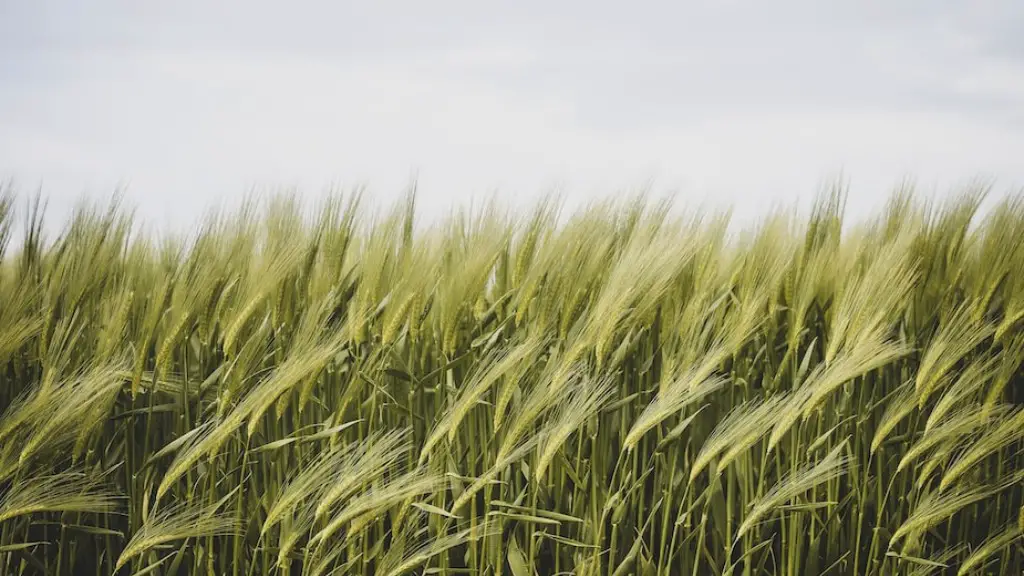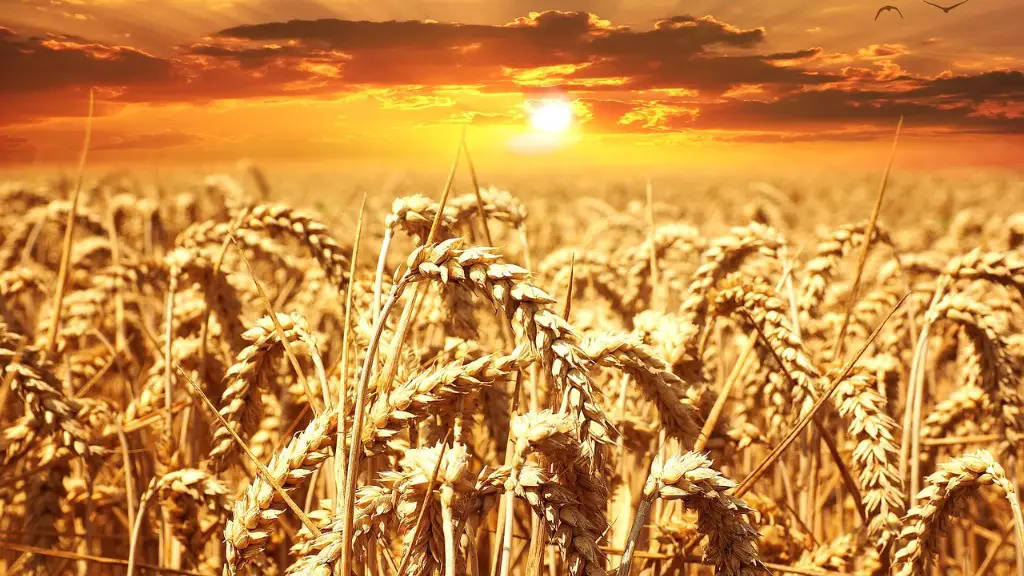The role of agriculture in the economy of Georgia is vast. Agriculture is one of the state’s leading industries, and it has a significant impact on the state’s employment, gross domestic product (GDP), and exports. In terms of employment, agriculture supports nearly 104,000 full-time jobs in Georgia, according to the most recent data from the U.S. Department of Agriculture. This includes jobs in farming, ranching, forestry, fishing, and hunting. It also includes jobs in the food and beverage manufacturing industry, which uses agricultural products as inputs. In terms of GDP, agriculture contributed $37.6 billion to Georgia’s economy in 2017, according to the U.S. Department of Agriculture. This is equivalent to 4.4 percent of the state’s total GDP. In terms of exports, Georgia exported $3.9 billion worth of agricultural products in 2017, according to the U.S. Department of Agriculture. This made Georgia the 14th largest exporter of agricultural products in the United States. Agriculture is a vital part of the economy of Georgia, and it plays a significant role in the state’s employment, GDP, and exports.
It is estimated that agriculture contributes around $68.4 billion to Georgia’s economy each year. This includes the direct and indirect impact of crops, livestock, forestry, and related industries such as food processing. Agriculture also supports jobs throughout the state, with an estimated 415,000 Georgians employed in agriculture and ag-related industries.
What is the economic impact of agriculture in Georgia?
This is a significant contribution to the state’s economy and highlights the importance of the agriculture industry. The industry provides many jobs and opportunities for economic growth.
Agriculture is a vital part of the US economy, contributing around $1264 trillion to the country’s gross domestic product (GDP) in 2021. This sector accounted for 54 percent of the nation’s total output, with farms alone contributing $1647 billion of this sum. Agriculture is thus a key driver of economic growth and prosperity in the United States.
Why is agriculture so important in Georgia
The agricultural sector in Georgia is an important contributor to the country’s GDP, accounting for 7-8 percent of GDP for the last five years. The sector also provides an important safety net for the rural population, considering that over 40 percent of Georgia’s population lives in rural areas.
Georgia’s agricultural sector is diverse, with the country producing a variety of crops and livestock. The main crops grown in Georgia include wheat, maize, barley, potatoes, and vegetables. The country also has a significant livestock sector, with cattle, pigs, sheep, and goats being the main animals raised.
The agricultural sector in Georgia faces a number of challenges, including a lack of modern infrastructure and technology, and a lack of access to markets. In addition, the sector is also vulnerable to climate change, with droughts and floods being a major risk.
Despite the challenges, the agricultural sector in Georgia remains an important part of the country’s economy and provides a vital safety net for the rural population.
Georgia is an ideal state for growing and producing agricultural commodities due to its long growing seasons, favorable climate, and large amount of farmland. The state leads the nation in production of peanuts, eggs, and boilers, making it a valuable and important part of the agricultural industry.
What drives Georgia’s economy?
Georgia’s modern economy has traditionally revolved around Black Sea tourism, cultivation of citrus fruits, tea and grapes; mining of manganese and copper; and the output of a large industrial sector producing wine, metals, machinery, chemicals, and textiles. However, in recent years, the economy has diversified, with growing sectors such as information technology, finance, and logistics.
The Georgian agriculture sector is relatively underdeveloped compared to other sectors of the economy, making up only a small percentage of GDP. However, the sector is growing rapidly due to state support and funding from the European Neighbourhood Programme for Agriculture and Rural Development (ENPARD). The sector employs a large percentage of the country’s workforce, and is therefore an important contributor to economic growth.
What are 3 effects of agriculture?
While the development of agriculture in a region can have positive effects on the natural life, oxygen production and climate in the region, it can also lead to negative effects such as inorganic nitrate pollution, pesticide pollution and salinity problems. These problems are especially prevalent in regions where agriculture is conducted intensively.
Agriculture plays a major role in economic growth and development. As the provider of food, it is a cornerstone of human existence. As a furnisher of industrial raw materials, it is an important contributor to economic activity in other sectors of the economy. Agriculture is an essential part of the economic fabric of any country and its importance should not be underestimated.
What is the main impact of agriculture
Agricultural pollution is a leading source of pollution in many countries. Pesticides, fertilizers, and other toxic farm chemicals can poison fresh water, marine ecosystems, air, and soil. They also can remain in the environment for generations. Agricultural pollution is a major problem because it contributes to the pollution of our water, air, and land. It also poses a threat to human health.
One out of seven Georgians works in agriculture, forestry or a related sector, and agriculture contributes more than $67 billion, or about 12%, to Georgia’s $787 billion dollar economic output annually. This Agricultural sector is vital to Georgia’s economy and way of life.
What is Georgia’s main source of income?
The individual income tax is Georgia’s top revenue source, generating between 40 and 45 percent of the state’s total revenue. This tax is imposed on the taxable income of individuals and is generally graduated, meaning that the tax rate increases as the amount of taxable income increases. Georgia’s individual income tax rates range from 1 percent to 5.75 percent.
In addition to crops like cotton and tobacco, rice and indigo became major cash crops in Colonial Georgia. African slaves were brought in by the thousands to labor on large plantations. Slavery was a vital part of the economy in Colonial Georgia, and the enslaved Africans were essential to the success of the cash crop economy.
What is the #1 agriculture state in the US
The top 10 agriculture-producing States in terms of cash receipts in calendar year 2021 were (in descending order): California, Iowa, Nebraska, Texas, Minnesota, Illinois, Kansas, Indiana, North Carolina, and Wisconsin. These states earned a total of $212.2 billion from cash receipts from farming. California, the top agriculture-producing state, earned $54.6 billion from cash receipts from farming, while Iowa, the second top agriculture-producing state, earned $30.4 billion.
Georgia is a state located in the southeastern United States. As of 2019, the state’s population is estimated to be around 10.52 million. Georgia is ranked 43rd in the country for healthcare, 26th for education, 12th for the economy, and 11th for infrastructure. The opportunity ranking for Georgia is 133.
What is the agriculture sector in Georgia?
In Georgia, a large percentage of the population works in agriculture. However, the scarcity of land hinders the development of large-scale farming and taking advantage of economies of scale.
Georgia is one of the top producers of poultry and eggs in the United States. The poultry and egg industry is a major contributor to the state’s economy, accounting for a third of Georgia’s farm commodities. Poultry and egg production is spread across the state, with three out of four counties involved in poultry and egg production. Georgia produces a variety of poultry and eggs, including chicken, turkey, quail, and duck.
What is the most important economic activity in Georgia
Georgia is a country with a rich history and a diverse culture. The economy of Georgia is largely based on agriculture, with the cultivation of grapes, citrus fruits, and hazelnuts being the main economic activities. Georgia is also rich in minerals, with gold, copper, and manganese being mined in the country. Additionally, Georgia has a thriving alcohol and beverage industry, producing both alcoholic and non-alcoholic beverages. Georgia’s manufacturing sector is also well-developed, with small-scale industries producing metals, machinery, and chemicals. Overall, the economy of Georgia is robust and diversified, providing opportunities for both local and foreign investors.
This shows that Georgia is a big producer of cotton, and that it is a valuable commodity. Cotton is used in a variety of products, including clothing, home furnishings, and more. Georgia exports a lot of cotton to other countries, and this is a major source of revenue for the state.
Conclusion
The effect of agriculture on Georgia’s economy is very positive. Agriculture is the state’s number one industry, and it plays a vital role in the state’s economy. Agriculture accounts for over $37 billion in annual economic activity in Georgia, and employs over 300,000 Georgians. Georgia is one of the top producers of pecans, peanuts, soybeans, and cotton in the United States. Georgia’s climate and soils are well-suited for a wide variety of crops, and the state’s farmers take advantage of this by producing a wide variety of crops. Agriculture is a very important part of Georgia’s economy, and it has a positive effect on the state’s economy.
The effect of agriculture on Georgia’s economy is twofold. On one hand, agriculture is a major industry in the state, employing many Georgians and contributing significantly to the state’s GDP. On the other hand, however, the state’s agricultural industry is also heavily reliant on subsidies from the federal government, which has been decreasing in recent years. As a result, the future of Georgia’s agricultural economy is uncertain.





